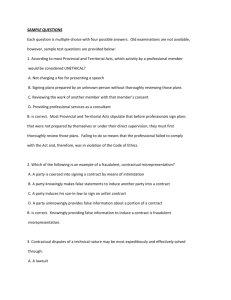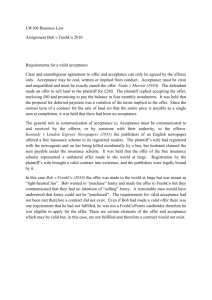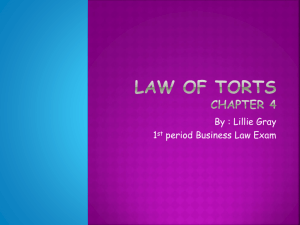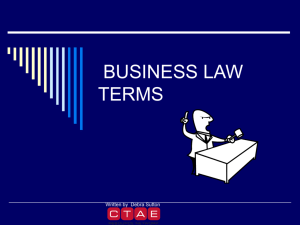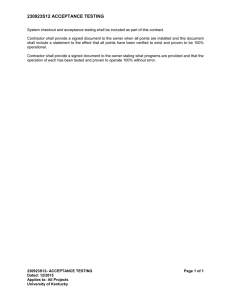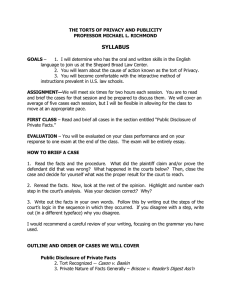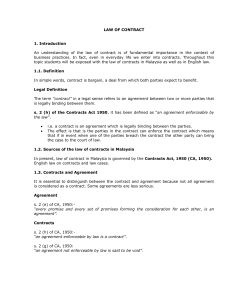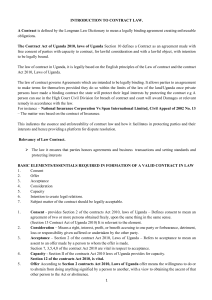Business Law 1 Exam Review: Contracts & Torts
advertisement
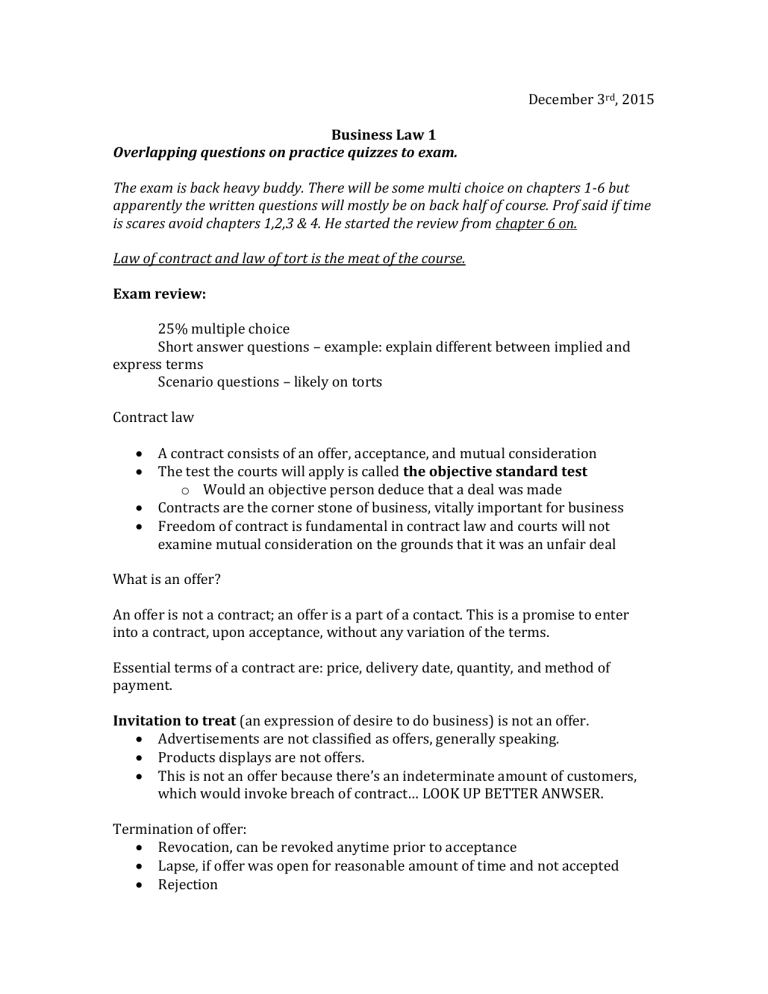
December 3rd, 2015 Business Law 1 Overlapping questions on practice quizzes to exam. The exam is back heavy buddy. There will be some multi choice on chapters 1-6 but apparently the written questions will mostly be on back half of course. Prof said if time is scares avoid chapters 1,2,3 & 4. He started the review from chapter 6 on. Law of contract and law of tort is the meat of the course. Exam review: 25% multiple choice Short answer questions – example: explain different between implied and express terms Scenario questions – likely on torts Contract law A contract consists of an offer, acceptance, and mutual consideration The test the courts will apply is called the objective standard test o Would an objective person deduce that a deal was made Contracts are the corner stone of business, vitally important for business Freedom of contract is fundamental in contract law and courts will not examine mutual consideration on the grounds that it was an unfair deal What is an offer? An offer is not a contract; an offer is a part of a contact. This is a promise to enter into a contract, upon acceptance, without any variation of the terms. Essential terms of a contract are: price, delivery date, quantity, and method of payment. Invitation to treat (an expression of desire to do business) is not an offer. Advertisements are not classified as offers, generally speaking. Products displays are not offers. This is not an offer because there’s an indeterminate amount of customers, which would invoke breach of contract… LOOK UP BETTER ANWSER. Termination of offer: Revocation, can be revoked anytime prior to acceptance Lapse, if offer was open for reasonable amount of time and not accepted Rejection Counter-offer, will terminate original or previous offer Death or insanity Even a firm offer is revocable any time before acceptance, except, in light of option agreements; A collateral contract that exchanges a sum of money in consideration for an agreement to hold the offer open, for that buyer, for the agreed period of time, at the agreed price. Review difference of contracts for tender, questions on tender are uncommon on exam though it is good to know difference. Acceptance: To be legally effective an acceptance must, demonstrate an unqualified and complete willingness to enter into the contract on the precise terms contained in the offer (otherwise it is a counteroffer); and be communicated- by words or conductto the offeror. Rule- acceptance is effective only when communicated Exceptions- unilateral contracts, postal rule cases Variation of contract: a pre existing duty is consideration in N.B, not anywhere else. This refers to the case with the Fredericton airport and how there was no consideration for additional money given to contractor, though the court ruled this was fine. Rule: A gratuitous promise unsupported by consideration in unenforceable Exceptions to rule: Promise under seal Promistoral estopal- only can be used as defense against having to pay a debt when the person money was owed to agree to forgive debt. Seal & contracts of guarantee: seal substitutes for lack of consideration. Difference between expressed and implied terms. Rules of interpretation: Plain meaning rule Parties intent rule Grounds that justify implying terms: Business efficacy Trade customs Prior dealings Statutory requirements Parole evidence rule: evidence cannot be admitted to add to, vary, or contradict a written instrument. Collateral agreements to a contract? A collateral oral agreement, if proven, with consideration, can be enforced. Using contractual terms to manage risk. Exceptions to the enforcement of contracts Unequal relationship Misrepresentation: can be fraudulent, negligent, or innocent Legal mistake Defective contract Written contracts (quasi-exception)- statute of frauds & sale of goods act o Exception to direct above- doctrine of part-performance A owner is required to disclose only hidden defects. Misrepresentation is a material, unambiguous, false statement of fact. Study page 183. Requirements for a restrictive covenant to be enforceable; Two step process in non-compete clause: o Is the restrictive covenant reasonable, as between the parties? o …. Difference between contractual rights and obligations. Enforcing a contract, plaintiff must prove balance of probabilities: privacy of contract breach of contract- conditions vs. warranties Almost certainly there will be a question on the tort of negligence Answer whether it is product liability or negligent misstatement. Haven’t been tested on chapter 12, its important Tort of defamation protects the reputation of individuals against unfounded and unjustified attacks. Plaintiff must prove that the defendant made a statement about the plaintiff: to at least one other person which presents the plaintiff in an uncomplimentary light, and would in the mind of a reasonable person lower the plaintiff’s reputation. A question dealing with false imprisonment, in connection with retailors, may appear Study 11 & 12 carefully. Focus on tort of defamation for chapter 12, but don’t overlook other either.

